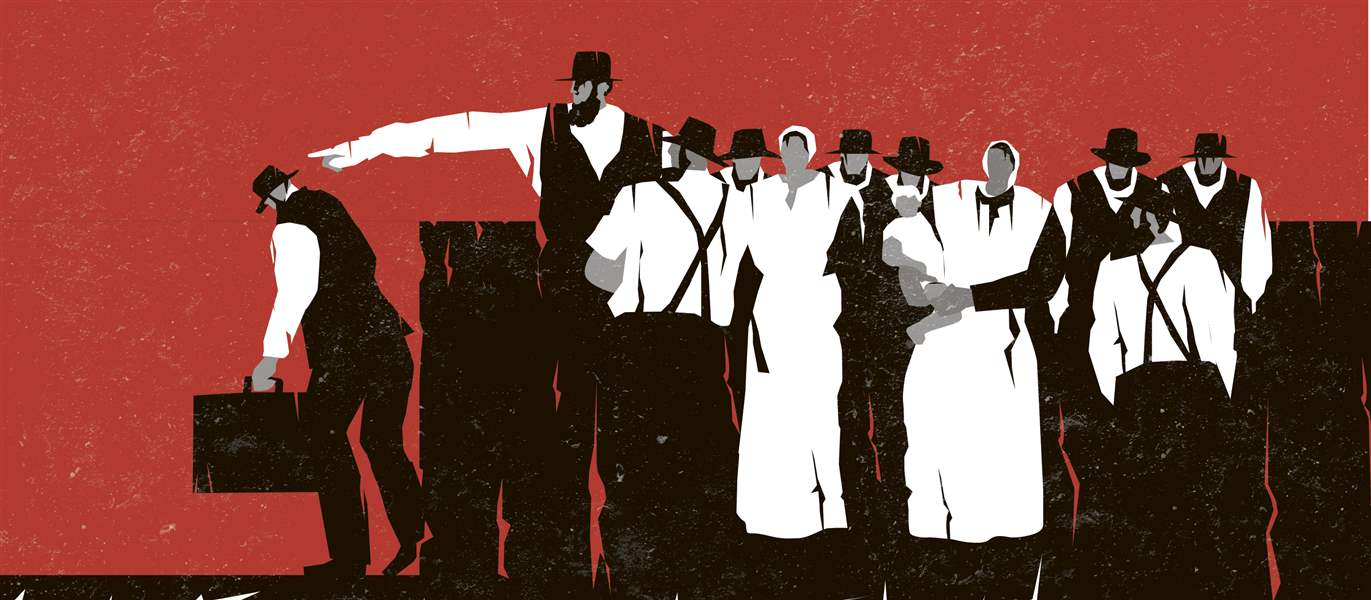
FAITH
Religious shunning leaves castoffs wondering why
8/4/2018
She couldn’t even pull into the driveway.
The conversation happened a decade ago, but Sharon Tyson, of Findlay, remembers it clearly. She had gratefully let a friend pick up her four children for a church get-together earlier in the day, and, initially, when that friend called her to say that she couldn’t bring the children back, Ms. Tyson didn’t think anything of it.
No problem. She would just swing by the friend’s house.
But that wasn’t the issue, as the friend explained in a phone call. Ms. Tyson had recently been disfellowshipped from their faith community, meaning her social contact with its members had effectively been cut off; that’s why she wasn’t taking her children to the get-together herself.
Her friend, based on instruction from a church elder, as she relayed to Ms. Tyson, was interpreting this to mean that Ms. Tyson shouldn’t even pull into her family’s driveway.
They met at a gas station; her friend didn’t make eye contact.
“I was like, ‘What?’ ” Ms. Tyson recalled. “I had always followed all the rules. I didn’t talk to anybody who had left [the faith], so I didn’t know this is how you were treated. I was shocked.”

Sharon Tyson
Sharon Tyson’s experience is perhaps an extreme example of religion-based shunning, but Gayle Jordan, executive director of the Kansas City, Missouri-based nonprofit Recovering From Religion, said stories are plentiful from individuals who see their social circles devastated after a split with a faith community.
These experiences tend to fall on a spectrum, she said, some reflecting the natural tensions that arise when a person pulls away from a tight-knit community and some, as in Ms. Tyson’s case as a Jehovah's Witness, reflecting an established religious practice.
The latter group, into which the Amish likewise fall, see shunning as an ultimately loving act in the interest of both the shunned individual and the broader faith community.
Jehovah’s Witnesses present it as a short-term tool, rather than a permanent punishment, according to literature published on the international faith community’s website. The national office did not reply to a request for comment. Online articles explain that disfellowshipping — while admittedly painful for all involved parties — is intended to push the affected individual toward compliance with faith teachings while while simultaneously protecting the community from negative influence.
Only baptized Witnesses who commit a serious sin and do not repent can be shunned, according to the website. Repentant individuals are welcomed back into the fold.
Shunning is more severe than the related practice of excommunication in that it carries social implications that the latter does not necessarily involve, said the Rev. Julian Davies, pastor of the University Church in Toledo.
It also has scriptural foundations, as Pastor Davies points out. In First Corinthians, for example, adherents are advised to “not associate with anyone who claims to be a brother or sister but is sexually immoral or greedy, an idolater or slanderer, a drunkard or swindler. Do not even eat with such people.”
But shunning can also be a devastating short or long-term experience for those affected, as those like Ms. Tyson who have chosen not to return to the faith communities that shun them can attest. They describe a slew of spiritual and relational stresses, among them the painful walls that rise up within families and the loss of the support of those closest to them when they may be at their most vulnerable.
Missy Bevier, an ex-Jehovah’s Witness of Grand Rapids, Ohio, was pregnant with her third child when she and her husband were disfellowshipped in 2011.
“This was extreme stress, stress to the max,” Ms. Bevier said. “Now I don’t have any family who will have anything to do with me, who will talk to me, who will support me. It’s just stressful.”
...
To lose a support system is tough. To lose a support system when it’s the only one you’ve ever known? Especially so.
Joe Keim of Savannah, Ohio, grew up Old Order Amish, a tradition that holds little, if any, separation between faith and lifestyle. In his isolated community in Ashland, Ohio, they lived according to the dictates of a 22-page ordinance letter that governed “every area of our lives,” he explained, down to the distinctive clothing they should wear.
As Jehovah’s Witnesses, Ms. Tyson, Ms. Bevier, and Danielle Davis, who also was raised in the tradition, enjoyed less restrictive upbringings in northwest Ohio and southeast Michigan. But they, too, navigated worlds that were narrowed, to some extent, by their faith.
While it’s not uncommon for youngsters to make friends within their faith communities — particularly in families, like theirs, that see religion as a more-than-once-a-week commitment — Ms. Tyson, Ms. Bevier, and Ms. Davis described an approach to faith that went further in actually discouraging meaningful friendships with non-Jehovah’s Witnesses.
Ms. Tyson’s and Ms. Davis’ parents each permitted their daughters to have just one childhood friend who did not share their faith, an allowance that each said was outside the norm. Ms. Bevier, for her part, recalled being allowed to play with the neighborhood kids only when she and they happened to be outdoors at the same time.
“It’s almost like a separatist organization,” Ms. Davis said. “Your entire life revolves around your family, who are Jehovah’s Witnesses, the other people in the congregation, who are Jehovah’s Witnesses.”
So to suddenly find yourself at odds with this community can be difficult for a variety of reasons, not least of which is the loss of contact — even if temporary — with family and friends.
For Ms. Tyson, for example, who had spent years consciously limiting her interactions to fellow Witnesses, it was difficult to trust and to open up to even those who wanted to help her and her children in the months that followed her break with the faith.
Ms. Tyson’s disfellowshipping related to her decision to leave her ex-husband, she said. She was seeking help from a domestic violence shelter at the time, she said, and recalled that to talk with social workers about her situation — and later to put herself and her children in the counseling she knew they needed after her adolescent daughters grew depressed and began to self-harm — required her to overcome deeply ingrained suspicions.
“I was so afraid of giving Jehovah’s Witnesses a bad name by telling what happened,” she said.
That Ms. Tyson still adhered to her former belief system at this point complicated her ability to cope. In her mind, she recalled, she was “in the wrong.”
Ms. Bevier described a similar experience of being disfellowshipped at age 19 — the second of three times she would be shunned. When her boyfriend would visit his family and she was asked to remain in the car or by herself in a back room of the house, she understood and accepted it.
It’s hard to shake deeply rooted beliefs, said Mr. Keim, who noted that it was the strength of his own spiritual convictions — that salvation comes through faith rather than compliance with “man-made” rules — that helped him when he left his community and was consequently shunned.
He sees it in the former Amish that he works with through Mission to Amish People, a nonprofit that he and his family began in Savannah, Ohio, that in part assists those leaving Amish communities. These deeply rooted beliefs push some to ultimately return to the communities they leave, he said, others to struggle their entire lives with an existential fear.
“In the mind of the church, and also in the individual,” he explained, “if I’m excommunicated and I die this way, I will go to hell. If I’m not right with the church, I’m not right with God.”
Ms. Bevier, like Mr. Keim, finally left her community after ultimately deciding that she did not adhere to its belief system any longer. That makes the social effects of shunning more intense than the spiritual.
But it’s hard, regardless, Ms. Bevier and Mr. Keim said.
“You get to your lowest point and you’re like, ‘Well, I’m going to come back,’ ” said Ms. Bevier, recalling her first experience being disfellowshipped at age 16. “It’s not that you’re not coming back for Jehovah. You’re coming back because you want to have your life back. You want to have friendships, your family. You want to have your family dinners. You want to see the people that you know again.”
Mr. Keim, for his part, didn’t re-establish a limited relationship with his parents until he’d been away from the community for 25 years. By that time, his parents had moved to a somewhat more open Amish community than the one in which he’d been raised.
Even today, when he visits, they set up a separate table for him at meal times.
…
While the resources that Mr. Keim and his team offer through Mission to Amish People underscore that it’s not easy to leave a faith community — especially one that’s been the entirety of one’s social and spiritual experience — it’s perhaps easier than it once was.
“Back in the day, when we left 30 years ago, there was very little support,” Mr. Keim said of his and his wife’s experience. “Today, [there’s] lots of support. Most of the time, those leaving will know somebody who has left before them.”
Support is wide-ranging, from online communities to in-person support groups and counselors. Recovering From Religion offers a 24-hour hotline and online chat service and resources pertaining to a wide variety of religious traditions. Mr. Keim’s nonprofit assists individuals in obtaining birth records, driver’s licenses, and other records that those who have left the Amish might uniquely need.
And, less formally, there are numerous social media communities. Ms. Tyson and Ms. Davis, who did not experience shunning when she left the church because she was not baptized as a Jehovah’s Witness, facilitate some of the latter on Facebook.
“A lot of [those who plug into these resources] have literally no support system,” Ms. Davis said. “Just to have somebody to talk to is an amazing thing sometimes. To confirm that that you’re not the only one who has gone through this can be really helpful.”
Whether an individual experiences religion-based shunning formally or informally, Ms. Jordan, of Recovering From Religion, said it’s always difficult. But there’s also “a certain freedom in separating from beliefs that you have come to the conclusion are not positive.”
Ms. Bevier knows it well: Her family is happier, her marriage stronger, she said. And she doesn’t have to look any farther than her daughter, Calysta, who she said never would have had an opportunity to compete and become a finalist on America’s Got Talent or relocate to Los Angeles had their family remained at the Kingdom Hall.
“There’s both a positive side and a negative side to leaving religion,” Ms. Jordan observed. “For most folks who hang on long enough, the negative side is temporary.”
Contact Nicki Gorny at ngorny@theblade.com or 419-724-6133.